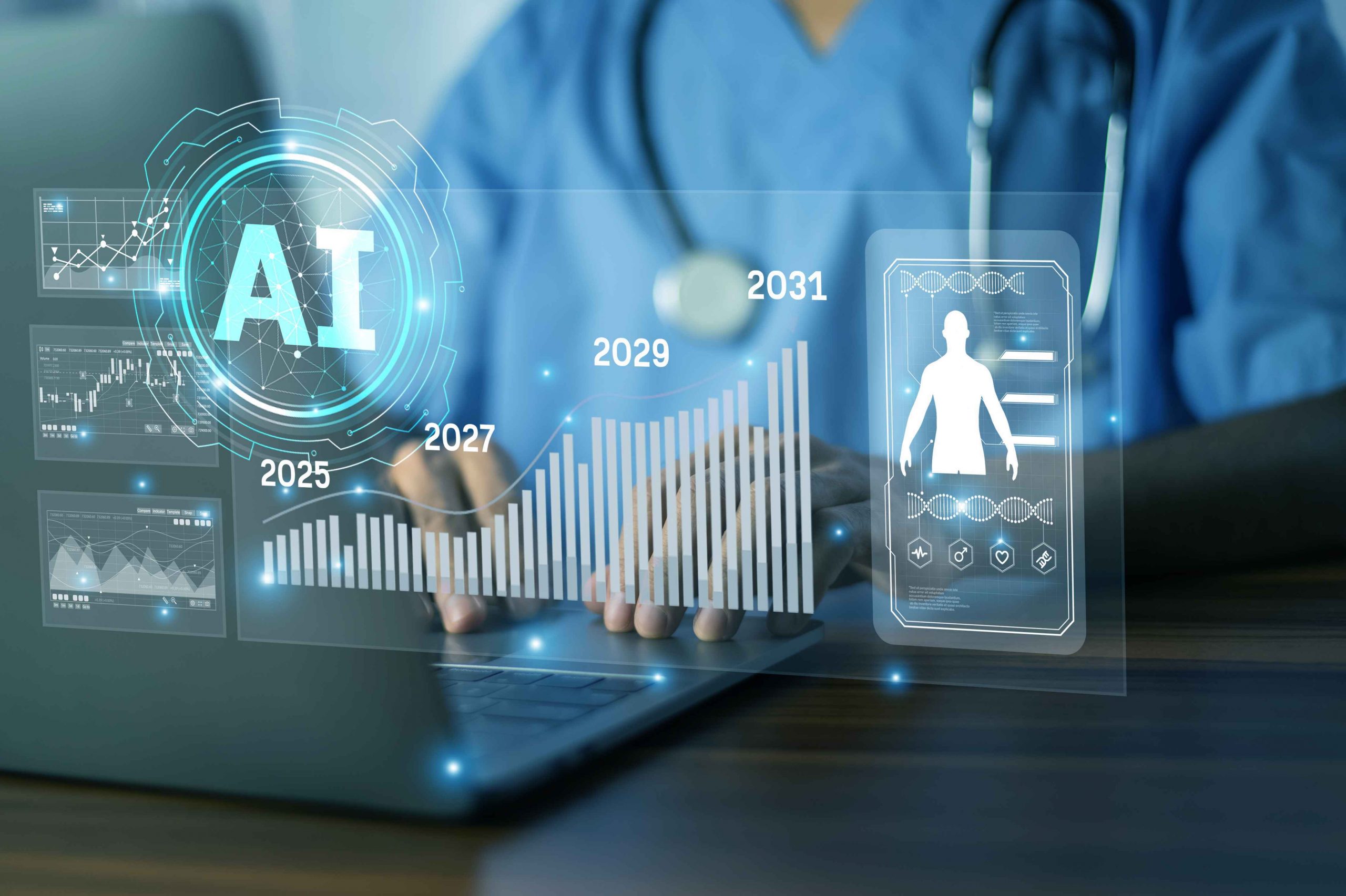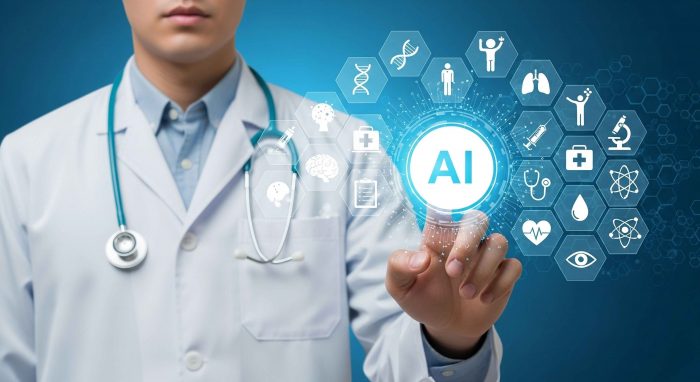Artificial Intelligence is no longer a futuristic buzzword in healthcare- it’s the new infrastructure of modern medicine. From clinical decision support to predictive analytics and virtual nursing assistants, AI-driven Healthtech solutions are redefining how care is delivered, managed, and experienced.
But as we approach 2026, the real story lies beyond the hype. The Healthtech sector stands at a critical inflection point- balancing immense potential with pressing challenges in privacy, ethics, accuracy, and regulation.
This article unpacks both facets- the advantages and challenges that will shape the next generation of healthcare innovation.
The Promise of 2026: Healthcare Reimagined by AI
By 2026, the integration of AI into healthcare will be more seamless, invisible, and indispensable than ever. From administrative automation to AI-enabled diagnostics, the goal will shift from efficiency to empathy at scale– creating patient-centric, data-driven, and HIPAA secure custom software solutions that personalize care like never before.
Let’s look at what’s changing- and what’s next.
Advantages: How AI Will Empower the Healthtech Sector

1. Precision at Every Touchpoint
AI is enabling healthcare systems to move from generalized treatment to precision medicine. Algorithms analyze genetic data, lifestyle factors, and clinical history to predict risks and suggest personalized interventions.
By 2026, custom healthcare solutions will integrate continuous feedback loops- learning from every patient interaction to optimize care in real time.
“In 2026, the doctor’s intuition will be guided, not replaced, by data.”
2. Automation That Frees Up Human Time
Routine administrative tasks- claim processing, scheduling, and documentation- will increasingly be automated. This shift allows clinicians to focus on empathy and complex decision-making rather than screens and paperwork.
Hospitals leveraging AI-driven Healthtech solutions are already reporting up to 30% reductions in administrative overhead and significantly improved clinician satisfaction.
3. Predictive and Preventive Care Models
AI will turn the spotlight toward prevention instead of intervention. Predictive analytics will help identify chronic conditions early, optimize hospital resource allocation, and anticipate population-level health trends.
In essence, 2026 will be the year healthcare finally becomes proactive, not reactive– powered by continuous data insights from wearables, IoT devices, and EHR systems.
4. Enhanced Telemedicine with Real-Time Intelligence
Telehealth platforms will no longer just connect doctors and patients- they’ll evolve into intelligent virtual care ecosystems.
A HIPAA secure custom software solution will use AI to triage symptoms, analyze speech tone for stress, or detect early warning signs during consultations. Combined with instant scheduling and adaptive follow-ups, telemedicine will feel human, contextual, and seamless.
5. AI as a Second Opinion, Not a Replacement
By 2026, medical AI will mature enough to act as a trustworthy co-pilot– assisting in radiology, diagnostics, and mental health evaluations while maintaining full physician oversight.
For example, AI models will rapidly scan imaging results to flag anomalies, while clinicians make the final call- enhancing accuracy without sacrificing accountability.
⚠️ The Flip Side: Challenges AI Will Bring in 2026
The rise of AI is not without friction. For every leap forward, there’s an equal need for caution.
1. Data Privacy and HIPAA Compliance Complexity
As data streams grow exponentially- coming from mobile apps, IoT devices, and EMRs- the pressure to ensure HIPAA-secure environments will intensify.
Missteps in anonymization or storage could lead to data breaches, legal consequences, and loss of patient trust. Custom healthcare software development companies will need to embed compliance deep into system design, not treat it as an afterthought.
“In 2026, HIPAA compliance won’t just be a regulation- it will be a design philosophy.”
2. Bias and Fairness in AI Models
AI learns from historical data. If that data carries biases- related to race, gender, or socio-economic conditions- the models will amplify those inequalities.
Healthtech providers must ensure transparent model training, diverse datasets, and clinical validation to maintain ethical integrity in AI-driven care.
3. Explainability vs. Accuracy Dilemma
Black-box algorithms may deliver high accuracy but offer little interpretability. For clinicians, understanding why an AI system suggests a diagnosis or treatment is critical.
The future lies in explainable AI– systems that can articulate reasoning, cite evidence, and foster doctor-patient trust rather than obscure it.
4. Integration with Legacy Systems
Many hospitals and clinics still operate with outdated EMR systems that struggle to communicate with modern APIs. Integrating AI capabilities without disrupting existing workflows will remain a significant challenge.
Custom healthcare solutions must therefore focus on interoperability, modular upgrades, and smooth data exchange between systems- balancing innovation with continuity.
5. Overdependence and Human Oversight
While AI enhances accuracy, overreliance may reduce clinicians’ vigilance or critical thinking. A balanced approach- where AI acts as an assistant, not a replacement- will be crucial for safety and accountability.
The “Fluff” vs. the Reality of AI in Healthcare
AI marketing often promises near-miraculous outcomes. But the real transformation in 2026 will be quiet, technical, and foundational.
- Fluff: AI will cure diseases.
- Reality: AI will improve disease detection, reduce administrative burdens, and make preventive care more efficient.
- Fluff: AI will replace doctors.
- Reality: AI will augment doctors, equipping them with insights that improve patient outcomes.
- Fluff: AI solutions are plug-and-play.
- Reality: Effective AI deployment requires domain-specific customization, compliance alignment, and human validation.
“AI in healthcare isn’t magic- it’s meticulous engineering combined with medical empathy.”
Untouched Areas Where AI Can Make a Real Difference
Despite progress, several critical areas remain underexplored- offering immense opportunity for AI-driven Healthtech solutions in 2026 and beyond:
1. Mental and Behavioral Health Monitoring
AI can decode voice, facial expression, and linguistic patterns to detect emotional distress or cognitive decline early.
Platforms like Prologic’s Behavioral Health solution already show promise in AI-assisted mental wellness tracking.
Read the Case Study →
2. Post-Operative and Chronic Care
AI-driven wearables can monitor vitals and detect complications even after discharge, enabling continuous care beyond hospital walls.
3. Drug Discovery and Clinical Trials
Machine learning models can accelerate trial matching, identify patient cohorts faster, and shorten drug development cycles- cutting both costs and risks.
4. Patient Education and Engagement
Conversational AI can simplify medical jargon, track adherence, and provide emotional support- building stronger patient-provider relationships.
Preparing for 2026: What Healthcare Leaders Must Do Now

- Adopt a Data-First Mindset: Clean, structured data will determine AI accuracy.
- Invest in HIPAA Secure Custom Software Solutions: Compliance and security must evolve alongside innovation.
- Prioritize Explainability: Ensure your AI systems can justify their recommendations.
- Collaborate with Experienced Tech Partners: Work with a custom healthcare software development company that understands the nuances of healthcare workflows and regulatory frameworks.
- Pilot, Measure, Scale: Start small, validate rigorously, and scale responsibly.
Final Thoughts
The onset of AI in 2026 will not replace human healthcare- it will reshape it. Hospitals will evolve into hybrid ecosystems where clinicians, algorithms, and patients collaborate in real-time to achieve outcomes that were once impossible.
But to unlock that future responsibly, the focus must remain on patient trust, transparency, and thoughtful adoption.
“AI will not redefine healthcare alone. Humans who use AI wisely will.”
Partner with Experts in AI-Driven Healthtech
Companies like Prologic Technologies, help healthcare organizations design AI-driven, HIPAA secure custom software solutions that transform patient care, streamline workflows, and ensure security and compliance from day one.
👉 Explore Healthcare Development Services at Prologic Technologies
👉 See How They’re Innovating Behavioral Health
👉 Request a Quote Today

